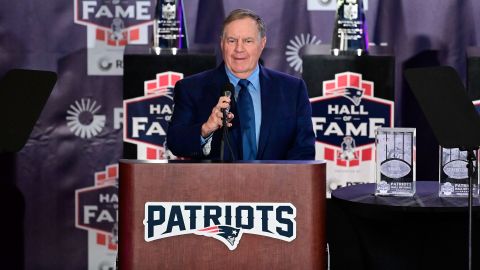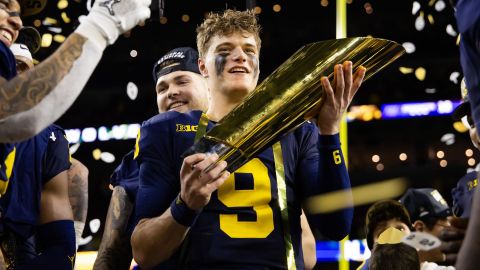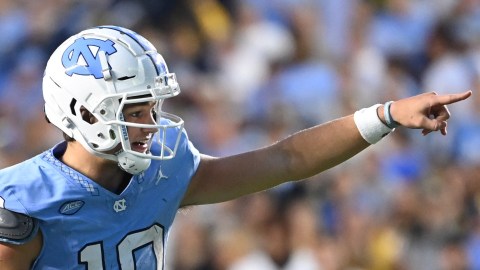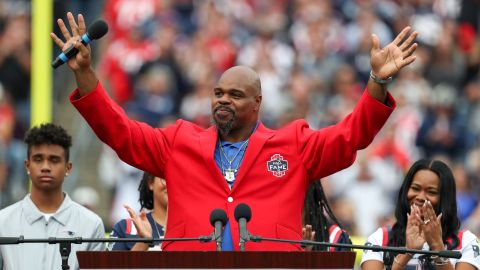The inevitable decision by the Patriots to place the franchise tag on Vince Wilfork finally was made official on Monday. Based on history, it seems that such a move would mean an ugly divorce will likely follow, whether it comes next season or later.
But when you look at the individual case of Wilfork and his unique situation, there's good reason to believe that history won't repeat itself this time around.
There are a number of varying factors surrounding Wilfork in 2010, with the largest being the upcoming uncapped year. Though it is a virtual certainty to happen, the Patriots would likely prefer to remain cautious and wait until it becomes official on March 5. Once the uncapped year has begun, the Patriots still may not be in a rush to become the first team to sign a big-name player to a contract, as it's hard to accurately predict which way the market will go.
In doing so, they run the risk of Wilfork's long-term price going up, but with the security of the franchise tag, they know they won't lose him this year. With the 2011 season having even more questions than this year's campaign, the one-year security (for both the player and the team) is a bit of a luxury.
Yet even with the future aspects considered, there's still the Patriots' history with franchising players. One common theme among the four players who have had the tag placed on them: none are still on the team.
Adam Vinatieri, Tebucky Jones, Asante Samuel and Matt Cassel all eventually moved on from the Patriots after being franchised. Of that group, only Vinatieri stayed for more than a year after being franchised in 2002 (he was franchised again in 2005 and left the following offseason as a free agent). Jones and Cassel were traded before playing for the Patriots as the franchise player, while Samuel played out the 2007 season and left the following offseason as a free agent.
In looking at Wilfork, that's not a promising history, yet his situation is undeniably different than those previously mentioned.
Vinatieri was given an offer in 2006 by the Colts that he would have been crazy to turn down (five years, $12.5 million, $3.5 million signing bonus). Jones was no longer needed when the team signed Rodney Harrison. Samuel's departure was a foregone conclusion long before it actually happened, because the Patriots have shown an unwillingness to place too much value on cornerbacks (they've drafted a corner just twice in the first two rounds under Bill Belichick, and both of those came after Samuel left). The team also agreed to not franchise him for a second year, which essentially gave the Patriots a six-month notice that Samuel would be heading to the highest bidder the following season. Cassel was only franchised so that the Patriots could get something for their unexpected asset, since he wouldn't be needed with the return of Tom Brady from injury.
Just as the contract situations of those players had little to do with each other, so too does Wilfork's. The nose tackle who's played in 90 of 96 possible games since 2004 has said repeatedly that all he wants is long-term security for his family. He hasn't said he wants to make Albert Haynesworth-type money (seven years, $100 million). He hasn't said he has major disagreements with the team, Belichick or owner Robert Kraft. He's simply looking to be offered a contract that will pay him for the next four or five years — he's earned that much, and the Patriots are fully aware.
Wilfork's value to the team has been obvious. That was especially evident when Wilfork did not play this season in Buffalo in Week 15. On the first drive of the game, with Wilfork sidelined due to a foot injury, the Patriots tried using Ron Brace and Mike Wright to stuff the middle. The result was not pretty. Fred Jackson and Marshawn Lynch ran all over the Patriots' defense, combining for 48 yards on nine carries (5.4 ypc). Once the Bills got inside the 10, the Patriots completely altered their defense, shifting to a five-linebacker, six-defensive back set, with just two players having a hand on the ground at the snap. It worked that day against a weak Bills offense, and it worked in spurts for the rest of the year, but it's hardly a strategy that could work for an entire season.
To put it simply, the Patriots place enormous value on the defensive line, spending three first-round picks on D-linemen since 2001 (Richard Seymour, sixth overall, 2001; Ty Warren, 13th overall, 2003; Wilfork, 21st overall, 2004). Even more importantly, the Patriots know full well just how valuable he is to the defense.
Last summer, Wilfork wanted an extension. He didn't get it. He ended up playing out the season and putting together another solid season. This year, he wanted a long-term contract. As of right now, he's yet to receive one.
But there is still plenty of time for the two sides to work out a contract, and there's good reason to believe that if things didn't get ugly last summer, the same should be true this summer.



